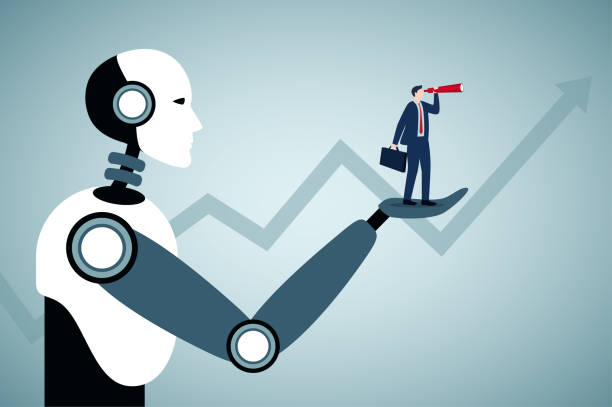AI in Financial Forecasting
 Bridge Group Solutions
Bridge Group Solutions
Introduction:
Financial forecasting has been a cornerstone of strategic planning for decades. Companies and investors have employed a variety of methodologies, from straightforward trend analysis to advanced econometric models, to forecast future financial performance. Those methodologies, though, collapse when confronted with big data, complicated market dynamics, and the unavoidable uncertainty of economic drivers.
Step in Artificial Intelligence (AI). The technology is transforming a broad range of sectors at breakneck speeds, and the financial sector is no different. AI, with its ability to learn from huge datasets, identify complex patterns, and shape itself to meet shifting conditions, stands poised on the threshold of revolutionizing financial forecasting as we know it. This blog delves into the exciting world of AI in financial forecasting, its uses, advantages, and most critical components that establish it as game-changing.
Data-Driven Insights:
Unlike traditional methods that may rely on individual assumptions or disconnected data, AI platforms sift through large amounts of historical and real-time data. These include financial statements, market indicators, macroeconomic data, news sentiment, and even alternative data. By filtering these data, AI can identify subtle patterns and correlations that human experts are likely to miss, offering more data-driven and precise projections.
The Capital Box, a finance and research platform, exemplifies how companies are applying such AI models to drive more reliable, data-backed investment insights and market projections.
For example, a credit risk analysis artificial intelligence system would find fewer such clear correlations between loan default and social media usage, thereby creating a more realistic and accurate estimate of risk than traditional credit scoring models.
Less Human Biases:
Human analysts, including even the more experienced ones, naturally have a tendency to be influenced by cognitive biases and hence prejudging their projections. AI algorithms lack personal choices and assumptions; they make projections on the grounds of purely what they've been taught. It prevents the interference of emotions or assumptions and builds less dishonest and unbiased projections.
Ongoing Learning and Adapting:
AI software learns and adapts continuously as there is newer information always available. With such a multi-purpose capacity to learn and adapt, they have the capacity to rebuild themselves based on shifting market conditions and demonstrate the validity of their own predictions with the lapse of time so that their predictions become more potent.
Example: Stock price forecasting model based on AI can be subjected to the shock in the stock market and change its own future predictions based on such new reality regarding the market
Sales Forecasting:
Computer programs of artificial intelligence may be utilized to identify the past sales, ad expenditure, season trend and extraneous variable and apply them to correctly predict the future sales in order to enable the companies to better plan their stocks and resources.
Example: An algorithm may predict increased demand for cold weather clothing based on weather patterns and historical sales.
Credit Risk Analysis:
AI is able to read more data points than traditional credit scoring approaches in a bid to more accurately measure the credit worthiness of individuals and organizations, reducing defaults and improving lending options.
Example: AI can read social media, web use, and other financial data in order to provide a better picture of credit risk.
Fraud Detection:
AI can identify unusual financial transaction activity that is possibly fraudulent and thereby prevent monetary loss.
Example: Artificial Intelligence can alert suspicious usage of a credit card far beyond regular use of the cardholder.
Algorithmic Trading:
Artificial Intelligence can implement algorithms to trade which observe market information and trade at extremely high frequencies based on profit-making predictive models.
Example: A market algorithm employing AI can recognize an intraday price discrepancy between two nearly identical assets and trade to capitalize on the arbitrage.
Economic Forecasting:
AI is able to forecast macroeconomic trends and geopolitical behavior in an attempt to make more accurate forecasts of future economic growth, inflation, and interest rates.
Example: An AI model can utilize central bank news releases, employment data, and consumer confidence surveys to forecast future inflation trends.
Personalized Planning:
AI is able to assess a person's finances, objectives, and risk tolerance to offer advice based on his unique needs and investment situations for retirement planning, investment, and other objectives.
Example: A financial planner using AI might compute a user's retirement fund from his existing salary, saving rate, and investment rate, as well as anticipated growth in future earnings and market fluctuation.
Employment Express, which specializes in placement and career training, could leverage AI-powered financial planning tools to personalize student career funding or education loan strategies based on future earnings potential.
Conclusion:
Embracing the AI-Driven Future of Finance
Artificial intelligence is no longer a desired phenomenon on the finance horizon; it's already present, changing the way we learn, forecast, and analyze financial performances. Being open to possibilities of data, unbiased, and learning by constantly refining, AI is making progressively precise, realistic, and enhanced forecasts of financial futures. Technology's role as it continues to evolve will continue to grow larger in making financial decisions. It is important companies, investors, and individuals remain up to date with the same because they can then venture into the world of money more fearlessly and futuristically. Let's move ahead further in the thrilling endeavor of AI and prediction.
Subscribe to my newsletter
Read articles from Bridge Group Solutions directly inside your inbox. Subscribe to the newsletter, and don't miss out.
Written by

Bridge Group Solutions
Bridge Group Solutions
Bridge Group Solutions delivers expert IT outsourcing services, helping businesses accelerate software development with cutting-edge technology and skilled teams. We specialize in integrating AI-driven tools and agile workflows to boost productivity and innovation.